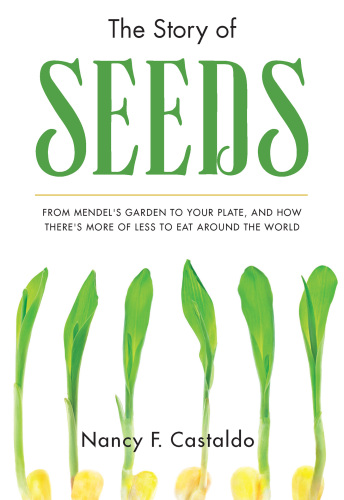
The Story of Seeds
From Mendel's Garden to Your Plate, and How There's More of Less to Eat Around the World
فرمت کتاب
ebook
تاریخ انتشار
2016
Lexile Score
1110
Reading Level
6-9
ATOS
7.6
Interest Level
6-12(MG+)
نویسنده
Nancy Castaldoناشر
HMH Booksشابک
9780544320253
کتاب های مرتبط
- اطلاعات
- نقد و بررسی
- دیدگاه کاربران
نقد و بررسی

January 11, 2016
In a topical blend of history, ecology, and social science, written in the tradition of Michael Pollan’s The Omnivore’s Dilemma, Castaldo (Sniffer Dogs) explains how seeds are fundamentally important to survival on Earth. While readers may think of seeds as ubiquitous and readily sustainable (if they think of them at all), historical examples of famine, such as the Great Hunger in Ireland, speak to the catastrophe that can result from a lack of crop diversity. Castaldo breaks down threats like climate change and disease, while providing a greater sense of interconnectivity in nature and within world communities. Offsetting a potentially dour or dire narrative, Castaldo profiles activist “Seed Warriors” who have championed the protection of agrobiodiversity; photographs of fruits, vegetables, and seeds appear throughout. Ages 12–up. Agent: Jennifer Laughran, Andrea Brown Literary Agency.

November 15, 2015
Championing seeds as one of our planet's most precious and vulnerable resources, Castaldo delivers a sobering global status report--and a call to action. Citing our food's precipitous decline in genetic biodiversity, Castaldo introduces readers to the pioneering plant scientists Gregor Mendel, Luther Burbank, and Nikolai Vavilov. Their respective work (in genetics, hybridization, and the collection and preservation of threatened seed varieties) contrasts starkly with the modern practice of genetically engineering and patenting seed for profit by corporate monoliths. Castaldo vividly sketches Vavilov, whose visionary global conservation expeditions yielded the world's first seed bank. Falsely implicated and imprisoned by Stalin's regime, Vavilov died of starvation in a prison camp. Indeed, seeds are both casualties and spoils of war. The Nazis, the Taliban, and other aggressors have stolen or destroyed seed stores, while brave scientists have transported and hidden these critical resources. Blending clear exposition with urgent polemic, Castaldo highlights the important distinction between hybridization and genetic modification of seed, the perils of monoculture, and the David-and-Goliath battles of family farmers vs. Monsanto. She profiles the work of Dr. Vandana Shiva and others--worldwide advocates for farmers' rights to reclaim, sow, and save genetically clean seeds. Concluding chapters explore heirlooms, the farm-to-table food movement, and exhilarating efforts--both formal and grass-roots--to save and safeguard our remaining, regionally adapted seed. Well-crafted and inspiring. (call to action, resources, seed libraries, glossary, author's note, sources, timeline, index) (Nonfiction. 12-15)
COPYRIGHT(2015) Kirkus Reviews, ALL RIGHTS RESERVED.

March 1, 2016
Gr 5-8-Castaldo notes that because of climate change, big farming, and habitat loss, our planet is losing biodiversity "at a depressing rate," and she proceeds to lay out the frightening hazards of monocultural agriculture-from the Irish potato famine to the current decimation of banana and coffee species-and the use of genetically engineered seed stock. Along with doing her best to raise reader anxiety about this issue with statistics and ominous trends, she also highlights the often-heroic efforts of scientists to create and preserve seed banks, notably the Vavilov Institute of Plant Industry in Saint Petersburg and the Svalbard Global Seed Vault in Norway. Additionally, she introduces a slate of worthy "Seed Warriors," from pioneers such as Luther Burbank and Nikolai Vavilov to the contemporary likes of Dr. Sanaa Abdul Wahab El Sheikh in Iraq, chef Sibella Kraus, Indian activist Dr. Vandana Shiva, and Carl White Eagle Barnes, "Cherokee Corn Elder." The author caps her plea for action with suggested activities and with extensive lists of print and online resources, seed "libraries" in and beyond the United States, and advocacy organizations. As Castaldo cites examples of biopiracy and agroterrorism and contrasts genetic modification research with "natural" hybridization, her approach is distinctly alarmist; offer Natalie Regis's Genetically Modified Crops and Food (Britannica, 2016) to readers after a more judicious evaluation of GMOs. VERDICT An impassioned call to action, likely to leave readers both scared and inspired.-John Peters, Children's Literature Consultant, New York City
Copyright 2016 School Library Journal, LLC Used with permission.

























دیدگاه کاربران